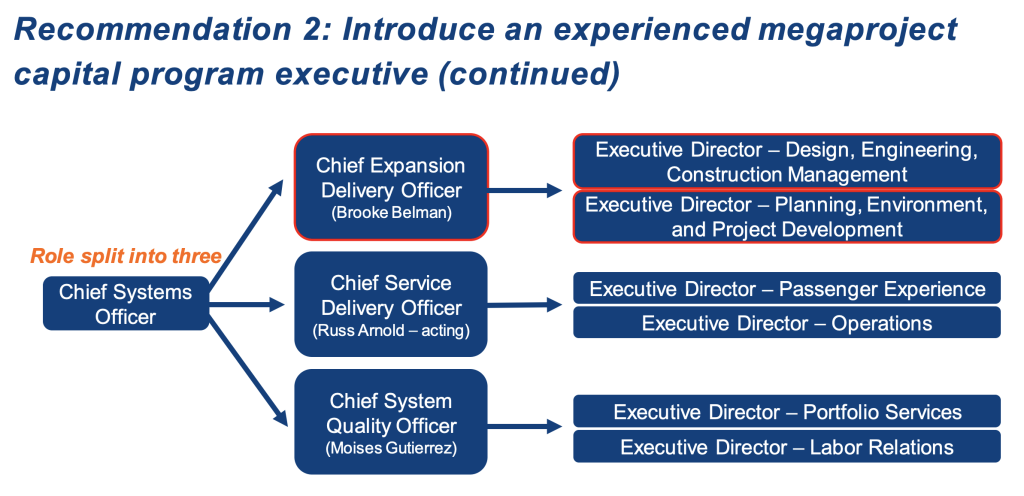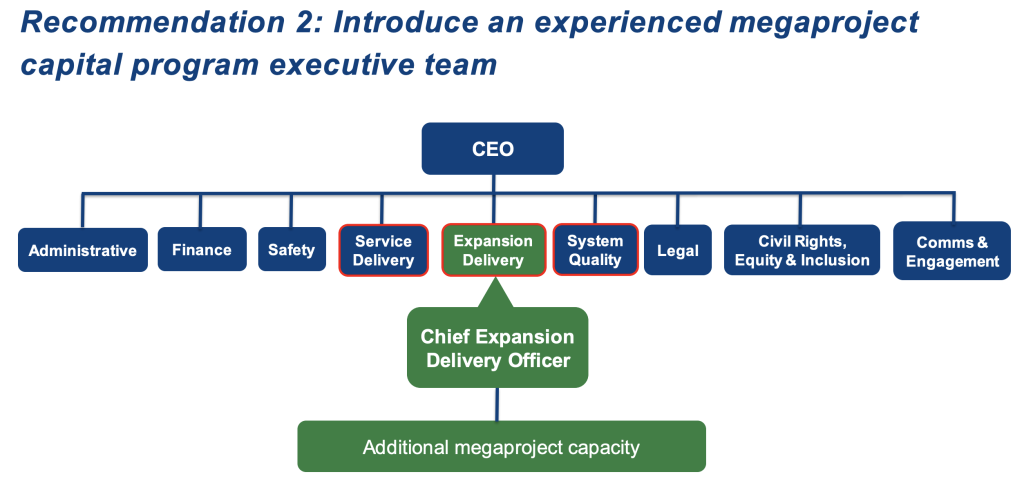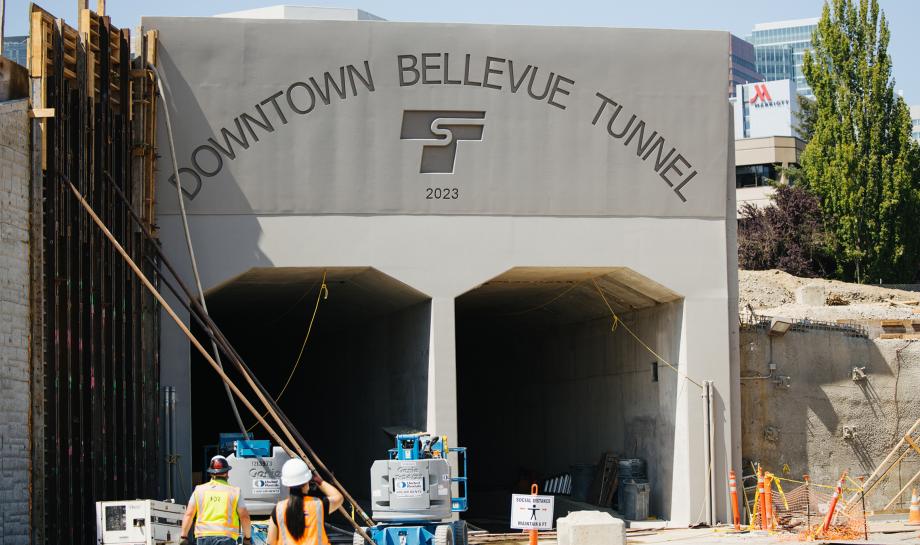
A group of outside experts in March told Sound Transit that its culture and operational structure must change to successfully deliver its planned rapid transit expansions. Many agency boardmembers voiced support for the group’s recommendations, but in a board meeting last month agency staff appeared resistant to one of the top recommendations: reforming operational structure and empowering top megaproject delivery experts.
With six specific recommendations issued by the Technical Advisory Group (TAG), the top two that the group told the agency to focus on are (1) rebuilding trust between staff and boardmembers and (2) hiring an executive team experienced in managing mega-capital infrastructure programs. At the time, TAG member Grace Crunican tried to impress the utmost importance of the top two recommendations by saying, “They must happen or don’t waste your time on the other four.”
In a briefing and memo late last month, agency staff explained how they were addressing the TAG recommendations and areas that they wanted direction from the board, but there was a clear lack of alignment on the second recommendation. Boardmembers pushed back against agency management’s assertion that their proposed executive team structure was following the spirit of the TAG recommendations.
Sound Transit muddies waters on need for outside expertise
During the briefing, Deputy CEO Brooke Belman outlined how the agency had restructured divisions and executive leadership since Julie Timm’s arrival as CEO. A shakeup of the agency’s sprawling set of workgroups has been adjusted for better executive oversight with the elevation of Belman as Chief Expansion Delivery Officer (CEDO), Russ Arnold as acting Chief Service Delivery Officer, and Moises Gutierrez as Chief System Quality Officer. Importantly, the CEDO oversees the two divisions responsible for planning, design, and construction of transit expansion projects.

“One clear area that we’ve already identified and are in agreement with the TAG concerns is building additional megaproject capacity,” Belman said. “Our next step will involve creating this additional capacity reporting to myself over the coming months.”
That additional capacity she referred to is hiring one megaproject expert position below her, with that new hire managing the West Seattle and Ballard Link Extensions (WSBLE) as well as the Tacoma Dome and Everett Link Extensions. Belman also suggested that the agency would outsource for expertise by hiring consultants in a program management capacity for the WSBLE projects.

In March, the TAG said that the agency needed to hire not one but three outside executives with differing roles and placed directly under the Sound Transit CEO, not below a deputy of the CEO. The top role would be an executive director of all capital investment programs. Underneath that person would be two deputy directors respectively responsible for managing the Sound Transit 2 and 3 programs. Additionally, the TAG said that these executives needed to have real-world experience in managing mega, multi-billion-dollar capital transportation projects and hold relevant engineering qualifications.
The agency’s proposal, however, is not consistent with those TAG recommendations. Several boardmembers, including King County Executive Dow Constantine, King County Councilmember Claudia Balducci, and Pierce County Executive Bruce Dammeier, picked up on that and cited the TAG’s megaproject management recommendations back to staff.
“I am a little concerned…it feels to me like what I’m seeing displayed on the org charts don’t reflect my reading of the TAG’s proposal, particularly when you talk about putting in this very robust, strong capital programs delivery organization that we’re going to need,” Dammeier said. “So, I would encourage the staff to not get locked in on things. When you bring that level of talent onboard, I would expect that their experience is gonna come into play with some strong recommendations on changes on processes, staffing, whatever, to really execute the program that we need executed over the next 20 years.”
In response, Timm seemed to walk back the early org chart proposal. She said that organizational structure was flexible and affirmed that it was the agency’s intent to hire three megaproject experts as advised.
Reassurances aside, the question remains of how much authority and ability to impact the organization the three new recruits will be given, as does the risk that a small or murkily defined role could limit interest from top management talent that the TAG and board are hoping to attract.
Other recommendations likely have a straighter path, board approved action motion
As for the other top recommendation on trust and responsibility, the agency’s response was clearer. Things that the agency is already doing include issuing clearer and more readable reports, implementing a project performance tracking dashboard, and preparing an annual capital program review (the 2023 version was just issued).
The agency is now focusing on implementation of a new structure to coordinate board requests via executive management and developing protocols for issuing clear staff recommendations on desired actions. Areas that staff are looking for dialogue with the board on include parameters on the type of decisions and actions that should be delegated to staff as well as further work “to foster collaboration across subareas and consideration of systemwide matters.”
The other four recommendations that the TAG issued, include: pushing down decision-making to the lowest levels possible and promote decision-making, improving procedures modeled on industry standards by eliminating unnecessary steps and delays, reforming the agency betterment policy and strongly enforcing it, and enhancing the relationship with the Federal Transit Administration to improve project delivery. Among these, the most substantive issues needing board guidance are lower-level decision-making and betterment policy reforms.

Agency staff would like to engage with the board on when to push down decision-making on matters to the lowest levels of administration with competency. “An important part of providing clarity regarding decision-making is knowing what needs Board approval and what is under CEO direction,” the agency memo states. “Staff propose to review the current delegation of authority levels between the Board and CEO.” An update on the action could come early next year. For now, agency staff are updating internal business practices to facilitate better staff-level decision-making.
In term of betterments, the TAG report suggested placing limitations on how much money Sound Transit will shell out to communities to make non-transit improvements. Agency staff want to have a discussion around this, existing betterment policies, and how best to enforce the betterments policies. Additionally, agency staff want to discuss whether or not the agency should pursue special permitting authority from the state legislature to eliminate red tape. Such authority could be a significant enhancement over existing rights granted by the state, which allow the agency to assert its projects as Essential Public Facilities under the state’s Growth Management Act but come with relatively narrow powers.
Separately, the agency is trying to improve its image with contractors so that it can have its pick of top-quality bidders. The agency was dinged big time by the TAG as having outmoded payment and change order processes that are driving contractors away.
“Through ongoing partnerships with American Council of Engineering Companies (ACEC) and Associated General Contractors of America (AGC), we have established workplans to improve and streamline invoice processing, change order management, and project closeout, as well as defining a standardized way to input and review project data, among other topics,” the agency memo said.
Rounding out the meeting, the full board adopted a motion calling for recruitment of the three megaproject experts, delineation of roles and responsibilities of board and staff, and retention of the TAG to monitor and report on progress through the end of 2024.
Stephen is a professional urban planner in Puget Sound with a passion for sustainable, livable, and diverse cities. He is especially interested in how policies, regulations, and programs can promote positive outcomes for communities. With stints in great cities like Bellingham and Cork, Stephen currently lives in Seattle. He primarily covers land use and transportation issues and has been with The Urbanist since 2014.


